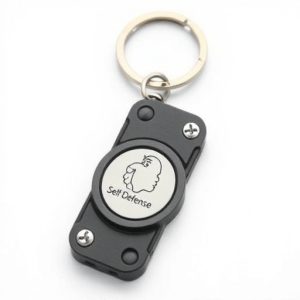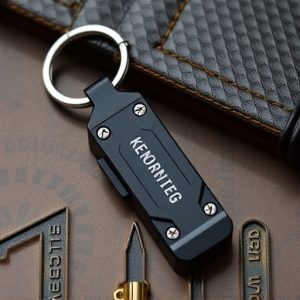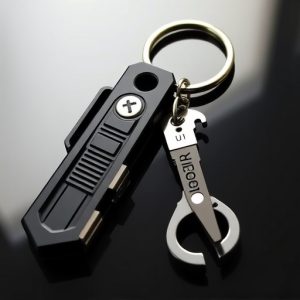Navigating State Laws: Legal Carry of Defensive Keychain Weapons
Understanding US state-specific laws is crucial for legally carrying defensive keychains, which vary…….
Understanding US state-specific laws is crucial for legally carrying defensive keychains, which vary from permit-free to highly regulated. Choosing durable materials like stainless steel ensures reliability and longevity, while adhering to best practices for maintenance and legal compliance safeguards personal safety and avoids legal repercussions. Keychain weapons' legality depends on classification as non-lethal or firearms, with varying restrictions on size, age, background checks, and permits.
“In today’s world, personal safety is paramount, and defensive keychains offer a compact solution for self-defense. This comprehensive guide explores the legal intricacies of carrying such devices across the US, focusing on state-specific guidelines that dictate their use. We delve into the importance of choosing durable materials to ensure reliability in critical situations. By understanding these regulations and best practices, individuals can leverage defensive keychains as a viable personal safety measure while adhering to legal boundaries.”
- Understanding Defensive Keychain Legal Carry Guidelines in the US
- Choosing Durable Materials for Your Keychain Weapon
- State-Specific Regulations and Their Impact on Legal Carry
- Best Practices for Carrying and Using a Defensive Keychain Weapon Legally
Understanding Defensive Keychain Legal Carry Guidelines in the US
In the United States, understanding defensive keychain legal carry guidelines is essential for individuals seeking to protect themselves in a compact and discreet manner. These guidelines vary across states, but they generally revolve around what types of self-defense tools are permissible as keychains, their size restrictions, and where they can be carried. It’s crucial to note that not all keychains designed for self-defense are created equal; durable materials like high-strength steel or advanced composites ensure the tool maintains its integrity during use.
The legality of defensive keychains hinges on their definition as “deadly weapons” or “firearms.” Some states differentiate between these categories, allowing certain types of keychains with blunt tips or non-lethal force capabilities while strictly regulating firearms. Carrying requirements often include age restrictions, background checks, and permit systems. Knowing your state’s specific laws is paramount to ensuring compliance and peace of mind.
Choosing Durable Materials for Your Keychain Weapon
When crafting or selecting a defensive keychain weapon, durability is paramount. Opting for robust and resilient materials ensures your self-defense tool remains functional in various scenarios. High-quality metals like stainless steel and titanium are excellent choices due to their strength and corrosion resistance. These materials can withstand regular use and harsh conditions, guaranteeing longevity.
Durable materials play a pivotal role in the effectiveness of a keychain weapon. Look for products with solid construction, where each component is meticulously designed to endure pressure and impact without compromising integrity. This attention to detail ensures that your keychain weapon performs reliably when needed most, providing peace of mind and enhancing personal safety.
State-Specific Regulations and Their Impact on Legal Carry
Each state in the U.S. has its own set of regulations regarding the legal carrying of defensive keychains, which can significantly impact accessibility and restrictions for individuals looking to protect themselves. These state-specific laws vary widely, from permissive to highly restrictive, depending on local interpretations of concealed carry policies. For instance, some states allow the open or concealed carry of self-defense tools like durable materials for keychain weapons without a permit, while others mandate specific licenses or permits for such devices.
Understanding these regulations is crucial for ensuring compliance and safety when carrying a defensive keychain. The variability across states underscores the importance of thorough research before purchasing or using such a device. Individuals must stay informed about local laws to avoid legal repercussions and ensure their right to self-defense remains protected.
Best Practices for Carrying and Using a Defensive Keychain Weapon Legally
When carrying a defensive keychain weapon legally, adhering to best practices ensures both your safety and that of others. Opt for a keychain designed with durable materials like high-quality stainless steel or titanium to withstand regular use and remain reliable when needed. Avoid flimsy options that may break easily, compromising their effectiveness as a self-defense tool.
Regular maintenance is key; keep your keychain sharp and in good working order. Store it properly, away from children and unauthorized individuals, in a secure location where it’s readily accessible to you but not visible to others. Familiarize yourself with local laws and regulations regarding hidden weapons, ensuring you understand the rules around open or concealed carry. This proactive approach maximizes the utility of your defensive keychain while adhering to legal requirements.
When it comes to defensive keychains, understanding legal carry guidelines is paramount. By adhering to state-specific regulations and practicing safe carrying techniques, you can ensure your right to self-defense while complying with the law. Investing in durable materials for your keychain weapon is also crucial for reliability, making them a practical choice for those seeking an accessible self-defense option. Remember, knowledge of legal carry guidelines and responsible handling are key to protecting yourself and avoiding any legal complications.


